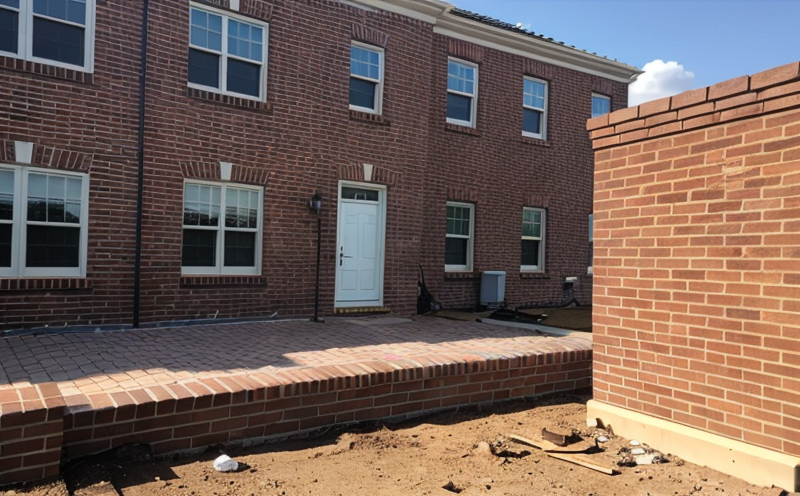EN 772 Shear Strength Testing of Masonry Units
The EN 772 series of standards provides a comprehensive framework for testing various properties of masonry units, including strength and durability. The EN standard specifically tailored to shear strength testing is the EN 772-10. This service ensures that masonry products meet stringent quality standards, which are critical for construction integrity and safety.
The shear strength test evaluates how well a specific type of brick or block resists shearing forces when placed in a compression mold. This is crucial for buildings subjected to seismic activity, high winds, or other dynamic loading conditions. For instance, in earthquake-prone regions like California or Japan, the structural performance of masonry elements can significantly influence building safety.
The test involves preparing specimens according to EN 772-10 requirements and subjecting them to shear forces until failure. This process not only assesses individual unit strength but also provides insights into how units interact within a wall or structure. Understanding these interactions is vital for designing robust, resilient buildings that can withstand environmental stresses.
The results of this test are essential for compliance with building codes and standards. For example, in the United States, the International Building Code (IBC) requires masonry materials to meet certain strength criteria. Similarly, in Europe, national regulations often reference EN 772 series standards for quality assurance.
Quality managers and compliance officers can leverage this test to ensure that their suppliers deliver products meeting exacting industry benchmarks. This service supports the broader objective of maintaining high construction standards across diverse sectors such as residential, commercial, infrastructure projects, and industrial facilities.
Why It Matters
The shear strength test is fundamental for ensuring that masonry units can withstand the forces they encounter in real-world applications. In buildings, walls are subjected to various stresses including wind loads, seismic forces, and thermal expansion and contraction. Ensuring these elements have sufficient shear strength prevents structural failures that could lead to catastrophic collapses.
From a broader perspective, compliance with EN 772-10 ensures that masonry products contribute to sustainable construction practices by using high-quality materials that last longer. This not only reduces the environmental impact of frequent replacements but also enhances overall building performance and longevity.
- Safeguards against structural failures during extreme weather or seismic events
- Supports compliance with international standards and local regulations
- Promotes sustainable construction practices by ensuring long-lasting materials
The test is particularly important for high-rise buildings, bridges, dams, and other structures where the integrity of masonry elements is paramount. By adhering to EN 772-10 standards, constructors can build confidence in their materials' performance, leading to safer and more reliable constructions.
Scope and Methodology
| Aspect | Description |
|---|---|
| Specimen Preparation | EN 772-10 specifies detailed procedures for preparing specimens, including dimensions, curing conditions, and surface finish. Proper preparation ensures accurate testing results. |
| Testing Procedure | The test involves placing the specimen in a compression mold subjected to increasing shear forces until failure is observed. The load at which failure occurs indicates the shear strength of the masonry unit. |
| Data Collection and Analysis | All data from the tests are meticulously recorded, including peak loads, displacement, and any visual signs of failure. These data points provide a comprehensive understanding of the material's behavior under stress. |
The methodology outlined in EN 772-10 ensures that testing is standardized across different laboratories, enhancing comparability of results. This standardization is critical for maintaining consistent quality and reliability in masonry products used in construction projects worldwide.
Competitive Advantage and Market Impact
- Market Leadership: By offering EN 772-10 testing, laboratories can differentiate themselves as trusted partners for quality assurance. This aligns with the growing demand from clients for transparent and robust testing practices.
- Informed Decision-Making: Providing accurate shear strength data helps manufacturers select appropriate masonry units that meet design specifications and regulatory requirements.
The service offers significant benefits to R&D engineers by enabling them to refine product formulations based on real-world performance data. For procurement teams, this ensures they source materials from reliable suppliers who consistently produce high-quality products.
- Enhanced Reputation: Compliance with international standards enhances the reputation of both laboratories and their clients in competitive markets.
- Premium Pricing: Laboratories offering such specialized services can command premium pricing, reflecting the value added through rigorous testing.
The market impact is substantial as it fosters innovation and quality assurance across the construction industry. By ensuring that masonry units meet strict shear strength criteria, this service contributes to safer, more resilient buildings that stand up to environmental challenges.





